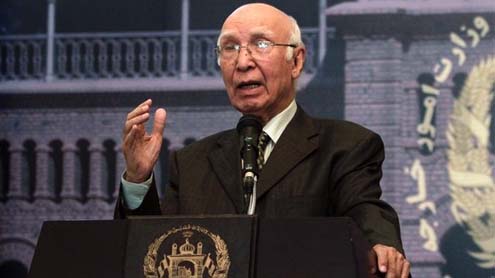
Adviser to the Prime Minister on Foreign Affairs and National Security Sartaj Aziz embarked on a ‘charm offensive’ in Kabul to persuade the Afghanistan government and President Hamid Karzai that Pakistan would extend its full support and cooperation in holding an intra-Afghan dialogue for peace and stability in the neighbouring country.
In talks with Afghan Foreign Minister Zalmai Rassoul, ways to promote bilateral relations also came under discussion, including bilateral trade enhancement. Inevitably, while enhanced trade is in the interest of both countries, it is of utmost importance for landlocked Afghanistan. The only caveat in Sartaj Aziz’s remarks during a joint press conference after the talks was that Pakistan would repeat its efforts for peace and reconciliation in Afghanistan as it did during the Doha initiative, provided ‘it is asked’, but at the appropriate time and in consultation with ‘other interested parties’.
The much-touted formula plugged by Sartaj Aziz was that while Pakistan was willing to help in holding intra-Afghan talks, the process must be ‘Afghan-owned and Afghan-led’. Now two points should be noted here. One, the Doha proposed talks (which have run into heavy weather over the Taliban’s flouting their office in Doha as if they were a government-in-exile) were never ‘intra-Afghan’ but US-Taliban. Two, even if Pakistan can rightly claim credit for assisting that process, it aroused even more mistrust and suspicion in Kabul because of the perception that the Karzai government had been sidelined.
Karzai’s chief of staff, Karim Khorram, went so far as to accuse Pakistan of seeking to divide Afghanistan by ceding certain provinces to the Taliban in a power and territory-sharing role to end the war with a de facto break up of the country. While Sartaj Aziz took pains to deny any such Pakistani plan or notion, the blunt remark by the Afghan Foreign Minister that efforts on both sides to strengthen relations, fight terrorism and ignite peace talks “have not been successful” better reflected the real state of acrimony than all the sweet diplomatese on show. Zalmai Rassoul did try to soften the blow by expressing hopes that the new government of Nawaz Sharif would start a new chapter of cooperation with Kabul.
It is disingenuous, difficult to believe, and likely to deepen mutual mistrust between the two countries though that Sartaj Aziz actually expected his audience to believe that Pakistan has ‘some influence’ over the Taliban because of the past, but does not control them. That may be partially true, if reports that the Taliban are no longer entirely amenable to the suggestions of their ‘handlers’ are to be believed. But the undeniable reality that Pakistan has harboured the Taliban in safe havens on its soil since 2001 erodes the credibility of the attempt at ‘deniability’ or ‘distancing’ Islamabad from the Taliban. ‘Influence’ therefore is perhaps the understatement of the year.
No one, including the west, poised as it is to withdraw next year, believes it is possible to achieve lasting peace in Afghanistan without the support of Pakistan. This perception reflects the deep and continuing intervention of Pakistan in Afghan internal affairs, stretching back a turbulent four decades. Starting with the anti-Daud (later anti-communist, anti-Soviet) Mujahideen, Pakistan was also the ‘mother’ of the Taliban. But much to its and Afghanistan’s woe, Islamabad has learnt the harsh lesson, albeit much too slowly, how dangerous and eventually self-destructive playing with armed proxies can prove.
Today, these experiments in projecting power into Afghanistan (and India) through armed proxies have wounded Pakistan itself to the quick because of the ‘blowback’ effect. If Afghanistan still bleeds from the Taliban insurgency based on Pakistani soil, Pakistan itself reels from the Pakistani variant of the Taliban that have, in only six years since they emerged, brought the country virtually to its knees. The past cannot be undone, but the future remains in our hands to shape. Afghanistan, Pakistan, the region and the world would be better served if the right lessons are imbibed from this chequered history and a turn taken towards non-interference in neighbours’ affairs, especially through deadly, fanatical, so-called soldiers of God. – DailyTimes












